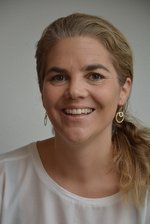LiveFishHealth
An alternative to using antibiotics in organic rainbow trout farming
Typically, vaccines for fish consist of killed bacteria, but there is currently no commercial vaccine against rainbow trout fry syndrome (RTFS) caused by the bacterium Flavobacterium psychrophilum. One of the challenges is that fish need to be vaccinated very early, and it is difficult to ensure that they take up the vaccine. By feeding small earthworms known as “white worms” with an auto-vaccine consisting of killed RTFS bacteria and later feeding trout fry with white worms containing these bacteria in their intestines, it is expected that sufficient antigens can be delivered to effectively activate their immune system. Thus, the fish will be naturally protected against RTFS - and losses due to disease as well as antibiotic treatment can be reduced or avoided.
The purpose of LiveFishHealth
The "LiveFishHealth" project aims to develop an alternative to using antibiotics in organic rainbow trout farming in aquaculture, making production more environmentally and economically sustainable. In the early stages of the fish's life, the disease Rainbow Trout Fry Syndrome (RTFS) poses a significant problem. The disease is caused by bacteria and results in high mortality. Therefore, trout fry are often treated with antibiotics multiple times. In organic aquaculture, only two annual treatments are allowed, and treating RTFS may mean that outbreaks of other diseases cannot be treated without losing organic status. Likewise, repeated treatments are undesirable in terms of production costs, animal welfare, and the development of resistance. Rainbow trout are predators and naturally consume other animals throughout their lives, but in aquaculture, they are fed dry feed from the beginning. For many other farmed fish species, fry must be fed live feed to produce robust animals and avoid high mortality in the critical early stages of their lives.
LiveFishHealth will develop an organic live feed based on "white worms" (enchytraeids), which will provide the trout with a more robust start in life, including establishing a natural and healthy gut flora. Enchytraeids are a central part of the decomposition of dead organic matter in nature, so the worms can be fed with organic by-products, enabling circular bioeconomy in worm production. Additionally, the project will establish a new concept for disease prevention by using worms as a vector for early fish vaccination.
LiveFishHealth will eliminate uncertainties, make organic aquaculture more economically robust, and make it more attractive for more producers to convert to organic production, which currently represents only 2% of Danish trout production. By increasing awareness and access to diets based on organic aquaculture and the environmental benefits of this production method, the project will contribute to increasing consumer interest. This will ultimately provide both climate and health benefits. Fish production in aquaculture emits significantly fewer greenhouse gases than other animal production, and fish meat reduces the risk of cardiovascular diseases compared to meat from warm-blooded animals.
The project step by step
LiveFishHealth will:
- develop an organic live feed based on "White worms" for trout fry
- develop a method for feeding rainbow trout fry with "White worms" and investigate effects on the fish's growth and state of health
- develop the use of "White worms" as a vector for a RTFS vaccine
- test a new concept for disease prevention using worms as a vector for early vaccination of fish
Project period
2024-2026
